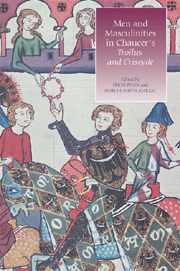Book contents
- Frontmatter
- Contents
- Contributors
- Abbreviations
- Introduction: The Myths of Masculinity in Chaucer's Troilus and Criseyde
- 1 “Beautiful as Troilus”: Richard II, Chaucer's Troilus, and Figures of (Un)Masculinity
- 2 The State of Exception and Sovereign Masculinity in Troilus and Criseyde
- 3 Revisiting Troilus's Faint
- 4 What Makes a Man? Troilus, Hector, and the Masculinities of Courtly love
- 5 Masculinity and Its Hydraulic Semiotics in Chaucer's Troilus and Criseyde
- 6 Masochism, Masculinity, and the Pleasures of Troilus
- 7 “The Dreams in Which I'm Dying”: Sublimation and Unstable Masculinities in Troilus and Criseyde
- 8 “A Mannes Game”: Criseyde's Masculinity in Troilus and Criseyde
- 9 Troilus's Gaze and the Collapse of Masculinity in Romance
- 10 Sutured Looks and Homoeroticism: Reading Troilus and Pandarus Cinematically
- 11 Being a Man in Piers Plowman and Troilus and Criseyde
- 12 “The Monstruosity in Love”: Sexual Division in Chaucer and Shakespeare
- Index
- CHAUCER STUDIES
7 - “The Dreams in Which I'm Dying”: Sublimation and Unstable Masculinities in Troilus and Criseyde
Published online by Cambridge University Press: 12 September 2012
- Frontmatter
- Contents
- Contributors
- Abbreviations
- Introduction: The Myths of Masculinity in Chaucer's Troilus and Criseyde
- 1 “Beautiful as Troilus”: Richard II, Chaucer's Troilus, and Figures of (Un)Masculinity
- 2 The State of Exception and Sovereign Masculinity in Troilus and Criseyde
- 3 Revisiting Troilus's Faint
- 4 What Makes a Man? Troilus, Hector, and the Masculinities of Courtly love
- 5 Masculinity and Its Hydraulic Semiotics in Chaucer's Troilus and Criseyde
- 6 Masochism, Masculinity, and the Pleasures of Troilus
- 7 “The Dreams in Which I'm Dying”: Sublimation and Unstable Masculinities in Troilus and Criseyde
- 8 “A Mannes Game”: Criseyde's Masculinity in Troilus and Criseyde
- 9 Troilus's Gaze and the Collapse of Masculinity in Romance
- 10 Sutured Looks and Homoeroticism: Reading Troilus and Pandarus Cinematically
- 11 Being a Man in Piers Plowman and Troilus and Criseyde
- 12 “The Monstruosity in Love”: Sexual Division in Chaucer and Shakespeare
- Index
- CHAUCER STUDIES
Summary
In his reading of Charlie Chaplin's City Lights, Slavoj Žižek argues that “In the network of intersubjective relations, every one of us is identified with, pinned down to, a certain fantasy place in the other's symbolic structure.” For Chaucer's Criseyde, this fantasy place is the place of the courtly lady, the sublime object of courtly order, male desire, and homosocial associations. However, instead of silently accepting her pinning, Criseyde speaks. Further, Criseyde dreams. She dreams of disintegration and bodily annihilation. Of course, Troilus dreams of dying as well – and in fact, the poem grants him his dreams while denying Criseyde hers. The voice of Criseyde gives us not just an image of a subject suffering who wants to be free from that suffering (this is what we see in Troilus), but instead, a subject suffering who chooses to remain in the world, who chooses the ethical path, rather than the path of pure solipsism. Chaucer's poem is not only about courtly love, but also about ethical relationality – of what a full awareness of and compassion for the other might actually look like. The subject position that chooses this fullness of subjectivity – the reality of being pinned down – is the female one while the primary male position in the poem (and the representative of the male symbolic structure that pins down those within it) chooses a path of significantly less ethical awareness.
- Type
- Chapter
- Information
- Men and Masculinities in Chaucer's 'Troilus and Criseyde' , pp. 97 - 114Publisher: Boydell & BrewerPrint publication year: 2008



